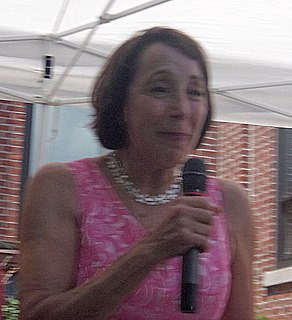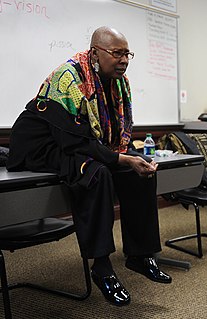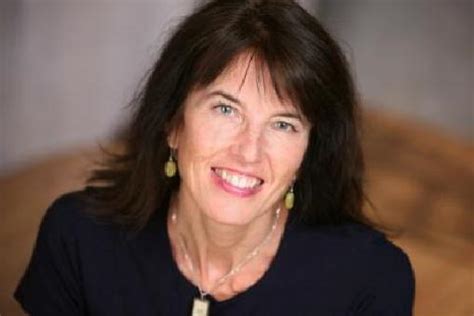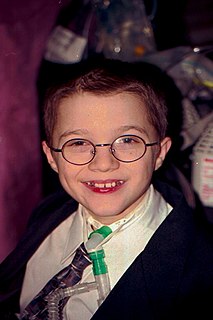A Quote by James Van Praagh
I had been doing private readings for ten years when my guides said, "We want you to reach more people." Then I said "How?" They said, "You're going to write a book." And I said, "Oh, yeah sure, I'm going to write a book. No way." But I did an outline. And I got pushed by my development circle.
Related Quotes
I always knew from the beginning that this was the only way to write Then We Came To The End - that it had to be in first - person plural if it was going to illustrate how the individual becomes part of the collective. I had no interest in writing the book in a more conventional voice. It goes back to that fascination I had with telling a story in multiple ways. It was the only choice I gave myself, really - I said "This is it, pal. If you can't tell a story this way, you're going to have to abandon the book. Write it this way or give up."
They said [on a day show], oh, you can't do a Chinese accent. That's - and I said, I'm not doing a Chinese accent. I'm doing my friend's accent. And they said, yeah, you can't do that. And I said, OK, but can I do a Russian accent? And they said, yeah, yeah, of course, you can do that. I said, and a British accent? They said, yeah, go ahead. And I couldn't understand.
When I was in fourth grade... this wonderful teacher said you didn't have to write a book report, you could just talk about the book, you could do a drawing of the book, you could write a play inspired by the book, and that's what I did. I got to be so famous. I had to go around to every school and perform it. It was just so natural and fun.
I guess what I have to say is, "Don't do it." I don't recommend it, because, having said that, the people that should do it will do it anyway, despite the fact that I've said not to do it. Only the ones who've said, "Oh, she said not to do it," aren't going to do it, and they shouldn't be doing it in the first place.
My wonderful editor, Jackie Onassis, asked me to write a book that I wanted to write. I said, 'Look, it's not going to be scandalized. I'm not going to talk about anybody like a dog. I'm going to say the positiveness of my life, and talk about those who have contributed to the way I've been going, and that's that.'
We'd decided to write a book about two friends. I gave her some coffee and then we sat there not knowing what to do. How do you start writing a book together? So Kate [DiCamillo] got up after about 10 minutes into this endeavor, and said, 'Well, that was fun,' and started to head out the door. I said, 'Wait, wait, wait, no no no,' because I'm a bit more patient.
I was once doing a question and answer period with the novelist Jane Smiley in a bookstore and someone asked us what our processes were and Jane said hers and then I said mine and Jane said, "Well, if I had a student like that I'd force him never to write like that again because you could never write a novel in the way that you write poetry."
When Howard Marks came out of prison, years later, I met him at a concert in South Wales; I was a young whippersnapper and Howard was kind of an outlaw hero. I said to him - and it's on tape, a cousin of his filmed our meeting - I said, "If you write a book, I want to play you in a movie." He said, "Let's shake on it," and we did. Thirteen years later, there we were, making the movie.
I didn't want it to be this way." "Yes, you did," she said, "because it is." "I just want to be with someone normal," he said. "I just want to have a normal life." "Excuse me," she said. "You're a little crazy," he said. "You're too old to act the way you do. You've got to grow up. You've got to take care of yourdelf. I'm afraid for you. You can't think that people are going to take care of you all the time.
The doctor said, 'He can't last a week.' And I did. And they said, 'There's no way this kid's going to last a month.' And I did. And so they said, 'Two years. He's not going to make it.' Two years. 'Five years. He can't do that.' I lived to be five years. 'He's never going to hit double digits.' And here I am, a new teenager.
"Patience, grasshopper," I counseled. "You don't want to seem overeager." "Right, that's why I said tomorrow," he said. "I want to see you again tonight. But I'm willing to wait all night and much of tomorrow." I rolled my eyes. "I'm serious," he said."You don't even know me," I said. I grabbed the book from the center console. "How about I call you when I finish this?""But you don't even have my phone number," he said."I strongly suspect you wrote it in this book."He broke out into that goofy smile. "And you say we don't know each other."

































